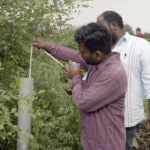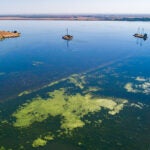Groundwater professionals have long united around the desire to “make the invisible visible.” It’s a slogan that finds its way into most conversations, publications, and speeches on the global groundwater crisis. Last year’s United Nations World Water Development Report focused entirely on groundwater. It’s chosen title? Groundwater, making the invisible visible.
One could be forgiven then for expecting groundwater to be highly visible at last week’s World Water Week—the sprawling annual gathering around which much of the global discussion on water pivots. Yet, mirroring ground-reality across much of the world, groundwater remained largely out of the spotlight. Only a handful of sessions, out of hundreds on offer, focused on the topic and none received center-stage treatment.
That is not to say there were no fruitful discussions on groundwater in Stockholm. In fact, the sessions that did focus on the topic produced some substantial conversations that provide a glimpse at the emerging global consensus on both the need for improved management at multiple scales and specific steps required to facilitate such improvements.
Two phrases from groundwater presentations last week help capture this emerging consensus:
“We are driving a car without a fuel gauge”
Klaudia Schachtschneider of OneWorld offered this line as a summary of the problems highlighted by panelists in an engrossing session on groundwater strategies in Africa. It was a sentiment echoed throughout conversations the week.
Both specific data and general knowledge about groundwater dynamics remain frustratingly elusive, even in areas where groundwater has been a priority for local and national policymakers. In almost every sense in every locale, we still don’t know enough about groundwater. Practitioners and decision-makers could use far more refined data to better model the complex, changing dynamics of aquifers. Policy-makers still often remain under-educated on the many economic and ecological benefits tied to sustainable groundwater management.
As one audience member mentioned in a question to a panel, groundwater data and governance have become a “bit of a chicken-and-egg problem.” It’s difficult to govern groundwater without adequate data, but you can’t acquire that data without proactive governance structures that fund and enable it. Groundwater, in its own stubborn way, remains invisible.

Fields pivot-irrigated by groundwater near Ohrigstad, South Africa. As is the case in many regions around the world, a sustainable groundwater future in southern Africa requires further data, transboundary cooperation, and engagement at the local level. Image: Wynand Uys.
“We treat groundwater like a child from another family…they are not ours.”
This evocative line from Michael Ramaano of the transboundary Orange-Senqu River Commission, while offered half in jest, gets at the heart of a second emergent theme from the week—the tendency to avoid responsibility for groundwater and the need to enable local-level ownership and management of groundwater.
Both hydrologists and policy-makers often highlight the unique multi-scale dimensions of groundwater management. Effective water policy has to at least attempt to work at local, national, regional, and global scales. While groundwater discussions last week explicitly acknowledged the importance of continued multi-scale efforts, speakers often settled on the overriding importance—both from a ‘problem’ and solutions dimension—of the local level.
Groundwater involves a unique level of self-governance—many users access groundwater via a very local, if not personally-owned borewell. This is both a blessing and a curse. Areas such as post-Green Revolution South Asia and suburbanizing Central Texas serve as cautionary examples of the dangers of runaway individual pumping.
Yet conversations last week also highlighted how local-level initiatives can drive impactful solutions to large-scale groundwater issues. Panelists from the session on African strategies noted the success of Zambia’s recent aquifer mapping efforts driven by ground-up micro-level processes. Other sessions highlighted efforts to target local women, youth, and indigenous groups. The World Bank’s Saroj Kumar Jha noted his own experience watching his mother’s oversight of the care for their family well in rural Punjab as an example of the importance of empowering women’s groups in groundwater management.
In a particularly evocative example that underlines the week’s twin themes of knowledge gaps and the centrality of the local, Md. Jakaria of North South University, cited the case of Bangladesh using feedback from local indigenous groups to shift groundwater extraction from white to red-brown sediment areas. Indigenous users knew the white sediment areas, previously prioritized by the government, were in fact more prone to arsenic contamination. The dynamics of groundwater are not equally invisible to all users.
Plugging the information gaps and prioritizing local solutions
The conversations on groundwater this year at Stockholm reaffirm our focus here at EDF. In our effort to help build climate resilient water systems, we prioritize groundwater because of its often-overlooked foundational importance to people and nature around the world.
The emergent groundwater themes from this week—knowledge gaps and local solutions—mirror our own strategic initiatives. Together with long-term partners, we continue to refine and develop a suite of data-focused tools and platforms that will equip both policy-makers and ground-level users with the information needed to make sustainable management decisions.
In addition to our data-rich tools, we are also co-developing holistic and adaptive groundwater governance and management frameworks that can (and must) be localized to a wide range of settings. We know there is no silver bullet, or one-size-fits-all solution, so our work and approach is tailored to local needs, context, and engagement of communities that have been historically marginalized and underrepresented.
While groundwater escaped the spotlight this World Water Week, conversations at Stockholm make it clear: we increasingly agree on the most pressing issues and most promising ways forward. It’s now time to make some headway in our collective quest for a more sustainable groundwater future for all.












